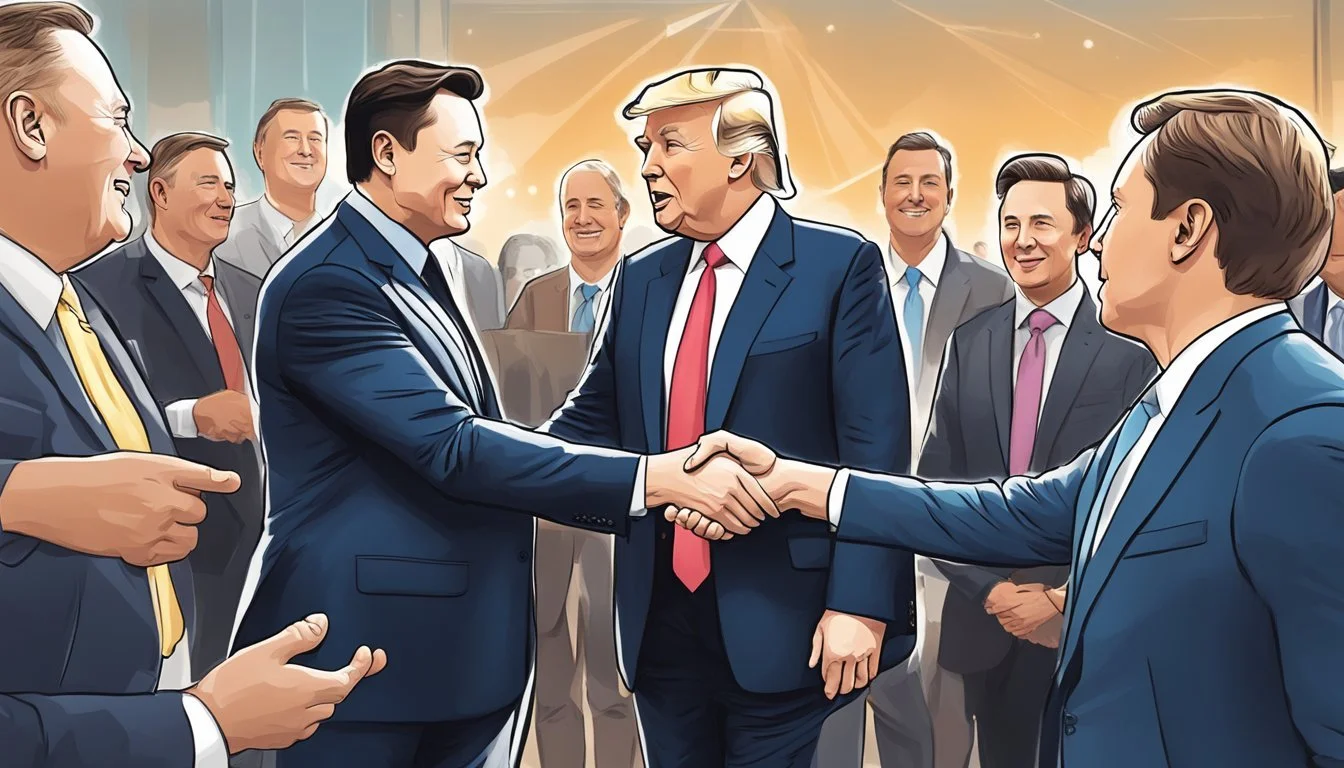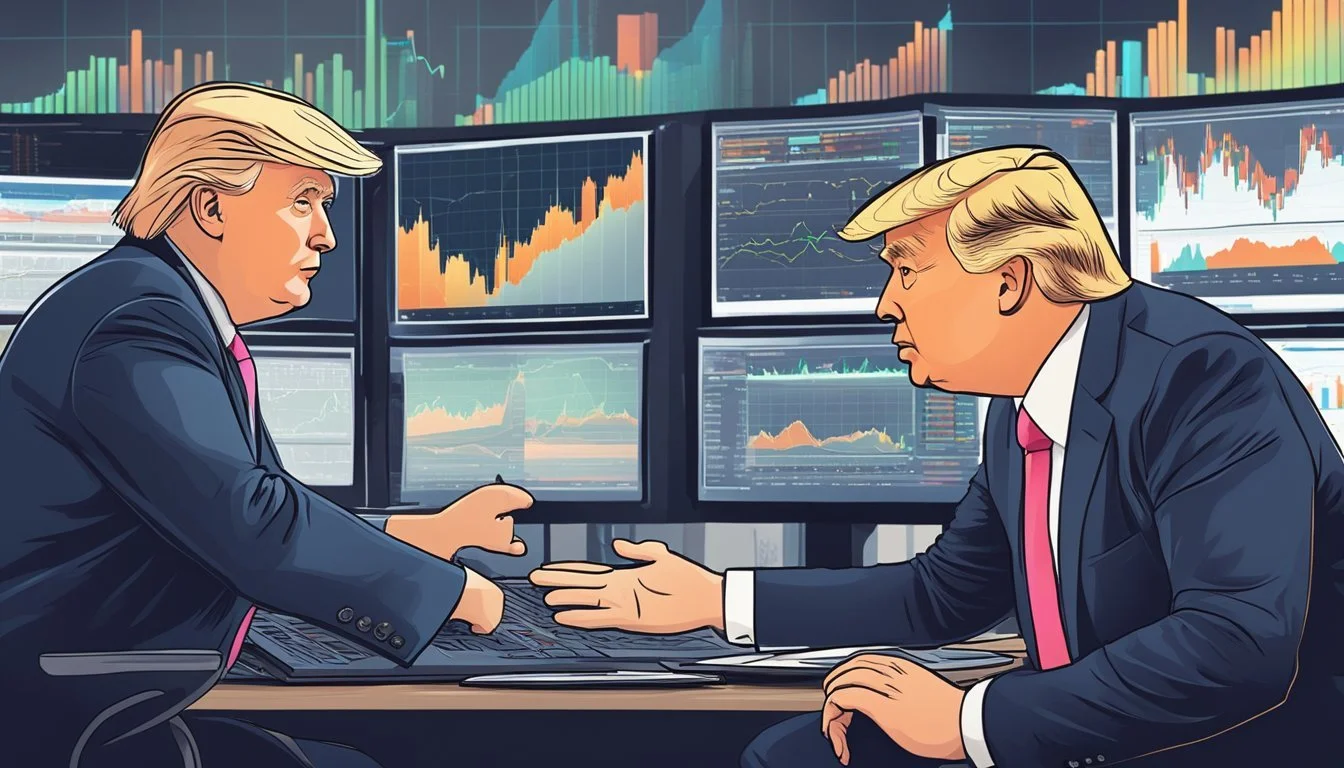Titans of Industry Clash in Public Arena
Tech Titan and Former President Clash on Social Media
The unlikely alliance between former President Donald Trump and billionaire entrepreneur Elon Musk has become a focal point of the 2024 U.S. presidential campaign. Musk, the world's richest man, has emerged as a powerful mega-donor and vocal supporter of Trump's bid to return to the White House.
Musk is leveraging his vast resources and influence to campaign aggressively for Trump, particularly in key battleground states like Pennsylvania. This surprising partnership has raised eyebrows across the political spectrum, with many questioning Musk's motivations and the potential implications for American democracy.
Trump has embraced Musk's support, even floating the idea of tapping the tech mogul to lead a proposed government efficiency commission if elected. This collaboration between a controversial former president and a polarizing business titan has injected a new dynamic into an already contentious election cycle, leaving voters and pundits alike speculating about the future of U.S. politics and governance.
Professional Backgrounds
Donald Trump and Elon Musk have both achieved significant success in their respective professional fields. Their careers have been marked by ambitious ventures and high-profile accomplishments.
Donald Trump's Business Empire and Political Rise
Donald Trump built his fortune in real estate development. He took over his father's company in 1971, renaming it The Trump Organization. Trump expanded into Manhattan, developing signature properties like Trump Tower.
In the 1980s and 1990s, Trump ventured into casinos and resorts. He acquired properties in Atlantic City and other locations. Some of these ventures faced financial difficulties and bankruptcies.
Trump transitioned to television in the 2000s. He hosted and produced "The Apprentice" from 2004 to 2015. The show boosted his public profile significantly.
In 2015, Trump entered politics. He ran for president as a Republican, winning the 2016 election. He served as the 45th President of the United States from 2017 to 2021.
Elon Musk's Entrepreneurial Ventures
Elon Musk co-founded Zip2, a web software company, in 1995. He sold it to Compaq for $307 million in 1999. Musk then co-founded X.com, which merged with Confinity to become PayPal.
In 2002, Musk founded SpaceX with the goal of reducing space transportation costs. The company has achieved numerous milestones in commercial spaceflight.
Musk joined Tesla Motors in 2004 as chairman, later becoming CEO. Under his leadership, Tesla has become a major player in electric vehicles and clean energy.
Musk's other ventures include Neuralink, focused on brain-computer interfaces, and The Boring Company, which aims to build underground transportation networks. His ambitious projects have made him a prominent figure in technology and innovation.
Political Endeavors
Donald Trump and Elon Musk have both made significant impacts on the American political landscape. Their actions have influenced campaigns, policy decisions, and public discourse.
Donald Trump's Campaigns and Administration
Trump's 2016 and 2024 presidential campaigns reshaped Republican politics. His America First agenda focused on immigration reform and trade policies. Trump's administration implemented tax cuts and appointed conservative judges to federal courts.
In the 2024 election, Trump secured strong support from billionaire donors. His campaign targeted battleground states like Pennsylvania, emphasizing voter registration efforts. Trump's rhetoric on the Second Amendment and immigration remained central to his platform.
Elon Musk's Influence on Policy and Regulation
Elon Musk emerged as a major political donor in 2024, pouring nearly $120 million into pro-Trump efforts. He leveraged his social media platform, X, to support Trump's campaign and spread political messages.
Musk's involvement extended beyond financial contributions. He engaged in policy discussions on government efficiency and regulation, particularly in areas affecting his businesses like electric vehicles and space exploration.
His political activism marked a shift for Silicon Valley figures, traditionally aligned with Democrats. Musk's support for Trump included hosting campaign events and mobilizing his followers on social media platforms.
Business and Government Intersect
The intersection of business and government has become increasingly prominent in recent years. This dynamic plays out through regulatory changes, government contracts, and high-profile figures moving between the public and private sectors.
Trump's Impact on Business Regulations and Government Contracts
Donald Trump's presidency saw significant changes to business regulations. His administration rolled back over 100 environmental rules and loosened financial industry oversight. These moves were praised by some business leaders but criticized by environmental and consumer advocates.
Trump also emphasized government contracts with American companies. He pushed for more defense spending, benefiting major contractors. His "Buy American, Hire American" executive order aimed to prioritize domestic firms for federal projects.
The Trump administration's approach to regulations and contracts reshaped the business-government relationship. Some industries saw increased opportunities, while others faced new challenges adapting to policy shifts.
Musk's SpaceX and Tesla Engagements with Government
Elon Musk's companies have extensive ties to government agencies. SpaceX has secured billions in NASA contracts for cargo and crew transportation to the International Space Station. The company also works with the Department of Defense on satellite launches.
Tesla has benefited from government incentives for electric vehicles. Federal tax credits helped boost sales of Tesla cars. The company has also received state-level support, including tax breaks for building factories.
Musk's ventures showcase the complex interplay between innovation-driven businesses and government priorities. His companies have delivered technological advances while relying on public sector contracts and policies to fuel growth.
Legal and Ethical Challenges
Elon Musk and Donald Trump face significant legal and ethical scrutiny due to their actions and statements. Their high-profile positions attract intense examination from regulators, the public, and media.
SEC Investigations and Market Impact
The Securities and Exchange Commission (SEC) has investigated Elon Musk multiple times. In 2018, Musk's tweet about taking Tesla private led to a $40 million settlement. The SEC continues to monitor his social media activity for potential market manipulation.
Musk's acquisition of Twitter (now X) raised concerns about insider trading and disclosure issues. The platform's policy changes under Musk's leadership have sparked debates about content moderation and free speech.
Donald Trump's businesses have also faced SEC scrutiny. The Trump Organization's financial practices and disclosures have been under investigation, particularly regarding property valuations and tax filings.
Governmental and Public Scrutiny
Both Musk and Trump have clashed with government agencies and faced public backlash. Musk's disputes with the National Labor Relations Board over union activities at Tesla plants have drawn criticism.
Trump's presidency was marked by numerous legal challenges, including investigations into his campaign's ties with Russia and his impeachment trials. His post-presidency legal issues include investigations into classified documents and election interference.
Media coverage of both figures has been intense, with legacy media outlets often critical of their actions and statements. This has led to accusations of bias from supporters and debates about media objectivity.
Public and Media Relations
Donald Trump and Elon Musk have both significantly shaped public discourse through their media strategies. Their approaches to communication and engagement with the press have been influential and controversial.
Donald Trump and the Legacy Media
Trump's relationship with traditional media outlets has been tumultuous. He frequently labeled unfavorable coverage as "fake news" and criticized journalists. This approach resonated with his base but strained relations with many news organizations.
Trump utilized Twitter extensively during his presidency, bypassing traditional media channels. His tweets often drove news cycles and policy discussions. The platform allowed him direct communication with supporters and critics alike.
Legacy media struggled to adapt to Trump's unconventional communication style. News outlets grappled with fact-checking his statements in real-time and maintaining objectivity in their coverage.
Elon Musk's Use of Twitter and Controversies
Musk's acquisition of Twitter in 2022 marked a significant shift in his media strategy. He rebranded the platform as X and implemented changes to content moderation policies. These changes sparked debates about free speech and platform responsibility.
Musk's tweets have influenced stock prices and cryptocurrency markets. His posts often blur the lines between personal opinions and official company statements. This has led to regulatory scrutiny and legal challenges.
X has become a platform for Musk to share political views and engage with critics. His support for Trump and amplification of certain political content have drawn both praise and criticism from different segments of the public.
Innovations and Contributions
Donald Trump and Elon Musk have made significant impacts in technology, space exploration, and infrastructure development. Their projects have pushed boundaries and sparked public interest in emerging fields.
Technological Advances and AI
Trump's administration launched the American AI Initiative in 2019, aiming to maintain U.S. leadership in artificial intelligence. This executive order prioritized AI research and development across federal agencies.
Musk's companies have been at the forefront of AI development. Tesla's self-driving technology utilizes advanced AI algorithms to navigate roads and make real-time decisions. OpenAI, co-founded by Musk, has made strides in natural language processing and robotics.
In the electric vehicle sector, Tesla has revolutionized the automotive industry. The company's innovations in battery technology and manufacturing processes have accelerated the adoption of electric cars globally.
Space Exploration and Starlink
SpaceX, founded by Musk, has transformed space travel with reusable rockets. The company's Falcon 9 and Falcon Heavy launchers have significantly reduced the cost of orbital missions.
The Crew Dragon spacecraft, developed under NASA's Commercial Crew Program, restored America's ability to launch astronauts from U.S. soil. This public-private partnership approach was supported by both the Trump administration and NASA.
Starlink, SpaceX's satellite internet constellation, aims to provide global broadband coverage. The project has launched thousands of satellites, bringing high-speed internet to remote areas.
Trump's Space Force, established in 2019 as the sixth branch of the U.S. military, focuses on space-based operations and technology development. This initiative has sparked renewed interest in space-related defense capabilities.
Cultural and Social Impact
The alliance between Donald Trump and Elon Musk has shaped public discourse and influenced key societal issues. Their combined reach and influence have sparked debates on free speech, technology's role in politics, and the power of wealth in shaping national conversations.
Influence on American Culture and Politics
Trump and Musk's partnership has amplified conservative voices on social media. Musk's acquisition of Twitter and subsequent policy changes aligned with Trump's critiques of "Big Tech censorship." This shift impacted online political discussions and news dissemination.
Their alliance highlighted debates on free speech limits and platform moderation. Musk's "free speech absolutist" stance resonated with Trump supporters who felt silenced by mainstream media and tech companies.
The duo's messaging on immigration and the Second Amendment reinforced conservative positions. Their influence extended beyond social media, affecting policy discussions and voter mobilization efforts.
Engagement with Current Social Issues
Musk and Trump's interactions with current events often set the tone for public debates. Their comments on climate change, electric vehicles, and space exploration shaped discussions on technological progress and environmental policy.
Their stances on COVID-19 measures and vaccine policies influenced public health conversations. Musk's criticism of lockdowns aligned with Trump's push to reopen the economy.
The pair's approach to worker rights and union organizing sparked discussions on labor issues in the tech and manufacturing sectors. Their positions on these topics often diverged from those of other business leaders and politicians.
Financial Markets and Investments
Billionaires like Elon Musk and Donald Trump wield significant influence over financial markets through their investment strategies and policy positions. Their actions impact cryptocurrency trends and shape economic policies at the highest levels.
The Billionaires' Investment Strategies
Elon Musk's investment approach focuses heavily on disruptive technologies. He allocates substantial capital to electric vehicles, renewable energy, and space exploration through companies like Tesla and SpaceX.
Trump's portfolio leans more toward real estate and branding. His Trump Organization holds numerous properties and licensing deals globally.
Both billionaires have shown interest in cryptocurrency. Musk's tweets often cause price swings in Bitcoin and Dogecoin. Trump has expressed skepticism about crypto but benefits from its deregulated nature.
Impact on Cryptocurrency and Economic Policies
Musk's embrace of Bitcoin as payment for Tesla vehicles (later reversed) sparked a crypto rally in 2021. His social media activity continues to influence crypto markets.
Trump's economic policies as president emphasized deregulation and tax cuts. He appointed Federal Reserve governors aligned with his views on monetary policy.
Government regulations remain a key concern. Cryptocurrency faces increased scrutiny from regulators worried about its use in illicit activities.
Silicon Valley's relationship with Washington has grown more complex. Tech leaders like Musk navigate a shifting landscape of antitrust concerns and calls for increased oversight of social media platforms.
Electoral Influence and Political Support
Elon Musk has taken significant steps to influence the 2024 U.S. presidential election. His actions have sparked debate about the role of wealthy individuals in shaping political outcomes.
Support for Political Candidates and Super PACs
Musk has thrown his weight behind Donald Trump's campaign, pledging substantial financial support. He held a solo event in Philadelphia to encourage voter registration for Trump supporters. The billionaire has committed at least $119 million to mobilize Trump's base.
Musk's X platform has become a key tool for promoting pro-Trump messaging. In a bold move, he announced a $1 million daily giveaway to registered swing state voters through Election Day. This tactic has raised legal questions and concerns about potential voter influence.
Engagement in Partisan Politics
Musk's involvement in partisan politics has intensified. He openly opposes the Biden Administration and Vice President Kamala Harris. His support for Trump marks a shift from his previous political stance.
The tech mogul's actions highlight the growing role of Super PACs in elections. His financial contributions and use of social media platforms demonstrate new ways wealthy individuals can impact political campaigns.
Musk's efforts have energized Trump supporters while drawing criticism from opponents. His actions underscore the complex relationship between wealth, technology, and political influence in modern elections.
Future Perspectives
The political landscape and technological advancements are poised for significant shifts. Donald Trump and Elon Musk's involvement in upcoming elections and potential ventures could reshape America's future.
Prospects in Upcoming Elections and Political Ambitions
Donald Trump's bid for the 2024 Presidential Election has gained momentum. His recent rally at Madison Square Garden, featuring Elon Musk, demonstrates growing support.
Trump's campaign focuses on economic reforms and government restructuring. Musk's potential role as "Secretary of Cost Cutting" signals a push for fiscal conservatism.
The Biden Administration and Vice President Kamala Harris face challenges in key battleground states like Wisconsin. Trump's team aims to capitalize on economic concerns and promises of government efficiency.
Musk's political ambitions remain unclear, but his increased involvement suggests a possible future in politics. His influence extends beyond technology into policy-making spheres.
Innovations and Potential Ventures
Musk's companies continue to drive technological innovation. SpaceX plans to expand its Starlink satellite network, potentially revolutionizing global internet access.
Tesla's focus on electric vehicles and sustainable energy aligns with growing environmental concerns. New battery technologies and autonomous driving systems are in development.
Trump's business acumen combined with Musk's technological expertise could lead to public-private partnerships. These collaborations may focus on infrastructure projects or space exploration initiatives.
Musk's Neuralink aims to advance brain-computer interfaces, with potential medical applications. The Boring Company continues to propose underground transportation solutions for urban areas.
Both figures emphasize American manufacturing and job creation. Their combined influence could shape future economic policies and technological priorities.






